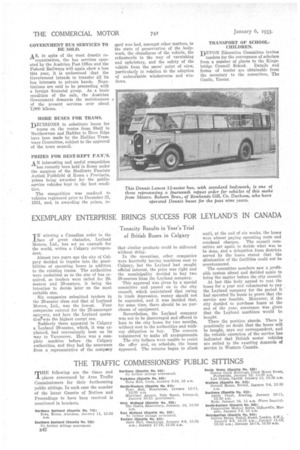EXEMPLARY ENTERPRISE BRINGS SUCCESS FOR LEYLAND'S IN CANADA
Page 56

If you've noticed an error in this article please click here to report it so we can fix it.
Tenacity Results in Year's Trial of British Buses in Calgary
TN winning a Canadian order in the 'face of great obstacles, Leyland Motors, Ltd., has set an example for the world, writes a Calgary correspondent.
Almost two years ago the city of Calgary decided to inquire into the possibilities of operating buses in addition to the existing trams. The authorities were undecided as to the size of bus required, so tenders were called for 26seaters and 29-seaters, it being the intention to decide later on the most suitable size.
Six companies submitted tenders in the 29-seater class and that of Leyland Motors, Ltd., was the lowest. Four companies entered for the 25-passenger catcs-ory, and here the Leyland quotationlwas the highest except one.
Suddenly there appeared in Calgary a Leyland 29-seater, which, it was explained, had conveniently been on its way to Vancouver. Here was a complete machine before the Calgary authorities, and they had the assurance from a representative of the company that similar products could be delivered without delay.
In the meantime, other companies were hurriedly having machines sent to Calgary, but the Leyland had caught official interest, the price was right and the municipality decided to buy two 29-seaters from the Leyland company.
This approval was given by a special committee and passed on to the city council, which maintained that owing to trade depression, money should not he expended, and it was decided that, for some time, there should be no purchases of equipment.
Nevertheless, the Leyland company was not to be discouraged and offered to loan to the city buses for two months, without oast to the authorities and with
out obligation to buy. The concern volunteered to make all arrangements.
The city fathers were linable to resist the offer and, on schedule, the buses appeared. The returns began to climb until, at the end of six weeks, the buses were almost paying operating costs and overhead charges. The council committee sat again to decide what was to be done, and a delegation from districts served by the buses stated that the elimination of the facilities could not be countenanced.
The committee members saw a profitable system ahead and decided again to bring the matter before the city council.
At last this body agreed to rent the buses for a year and volunteered to pay the Leyland company for the period it had operated Its buses to prove that the service was feasible. Moreover, if the city decided to purchase buses at the end of the year, assurance was given that the Leyland machines would be bought. There the position stands. There is practically no doubt that the buses will be bought, says our correspondent, and the reliable operation of the service has indicated that British motor vehicles are suited to the exacting demands of service in Western Canada.




























































































